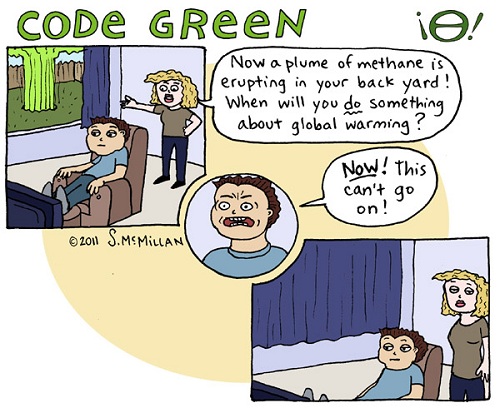
In Murry Salby's Correlation Conundrum, Dikran Marsupial thoroughly dissects a patently incorrect assertion made by Prof Murry Salby that the rise in atmospheric CO2 is not driven by anthropogenic emissions. Dikran's dissection generated the most comments of the articles posted this past week.
Dana's Lindzen and Choi 2011 - Party Like It's 2009 and Dikran's Roy's Risky Regression also generated significant numbers of comments during the week.

"Do Something"
Source: Stephanie McMillan, Code Green.
"I think it is inevitable that climate change will affect the frequency and intensity of extreme events. Weather can be characterised in terms of a mean value (the climate) and variability around the mean. Climate change will shift the mean value (by definition), and hence change the probability of extremes unless the variability also changes to compensate exactly (and there is no reason to expect this). The difficulty is in calculating the contribution of climate change to an individual extreme event. This is currently an active research area, known as operational attribution, in which many climate model simulations are made with and without forcing due to climate change in order to compute differences in the probabilities of particular events."
Dr Doug Smith, who leads decadal climate prediction research and development at the Met Office Hadley Centre
Source: Is it now possible to blame extreme weather on global warming? by Leo Hickman, Environment Blog, The Guardian (UK), July 3, 2012
Desertification: Land degradation in arid, semi-arid, and dry sub-humid areas resulting from various factors, including climatic variations and human activities. The United Nations Convention to Combat Desertification defines land degradation as a reduction or loss in arid, semi-arid, and dry sub-humid areas, of the biological or economic productivity and complexity of rain-fed cropland, irrigated cropland, or range, pasture, forest, and woodlands resulting from land uses or from a process or combination of processes, including processes arising from human activities and habitation patterns, such as (i) soil erosion caused by wind and/or water; (ii) deterioration of the physical, chemical and biological or economic properties of soil; and (iii) long-term loss of natural vegetation.
Drought: In general terms, drought is a ‘prolonged absence or marked deficiency of precipitation’, a ‘deficiency that results in water shortage for some activity or for some group’, or a ‘period of abnormally dry weather sufficiently prolonged for the lack of precipitation to cause a serious hydrological imbalance’ (Heim, 2002). Drought has been defined in a number of ways. Agricultural drought relates to moisture deficits in the topmost 1 metre or so of soil (the root zone) that affect crops, meteorological drought is mainly a prolonged deficit of precipitation, and hydrologic drought is related to below-normal streamflow, lake and groundwater levels. A megadrought is a long-drawn out and pervasive drought, lasting much longer than normal, usually a decade or more.
Source: Annex I (Glossary) to Climate Change 2007: Working Group I: The Physical Science Basis, IPCC Fourth Assessment Report.
A complete listing of the articles posted on SkS during the past week.
A list of articles that are in the SkS pipeline. Most of these articles, but not necessarily all, will be posted during the week.
Per the Met Office Hadley Centre's
"We produce world-class guidance on the science of climate change and provide a focus in the UK for the scientific issues associated with climate science.
"Largely co-funded by Department of Energy and Climate Change (DECC) and Defra (the Department for Environment, Food and Rural Affairs), we provide in-depth information to, and advise, the Government on climate science issues."
"As one of the world's leading centres for climate science research, our scientists make significant contributions to peer-reviewed literature and to a variety of climate science reports, including the Assessment Report of the IPCC. Our climate projections were the basis for the Stern Review on the Economics of Climate Change."
Posted by John Hartz on Monday, 9 July, 2012
 |
The Skeptical Science website by Skeptical Science is licensed under a Creative Commons Attribution 3.0 Unported License. |